25 Points: Go to Work and Do Your Job. Care for Your Children. Pay Your Bills. Obey the Law. Buy Products.
 |
Go to Work and Do Your Job. Care for Your Children. Pay Your Bills. Obey the Law. Buy Products.
by Noah Cicero
Lazy Fascist Press, 2013
188 pages / $12.95 buy from Amazon
|
1. Still one of the best titles of any novel, ever.
2. This book is in two parts. Part 1 is narrated by a reasonably bland, vaguely liberal character named Michael who starts a job at a ‘treatment centre’ (for treatment centre read prison) complex called NEOTAP. Part 2 is narrated by NEOTAP IT employee, work colleague and soon to be girlfriend Monica.
3. The whole thing is a mish-mash of different genres, different registers, narrative structures, etc., and is largely concerned with the kind of Orwellian power of the NEOTAP system.
4. The NEOTAP system is, roughly speaking, an analogy for American (Global?) Capitalism and its ‘5 pillars’ (the five pillars of the book’s title). I was pleased that it was only a lightly fictionalised dystopia as there is little need to overly fictionalise something that very much seems to me to be the dystopia of contemporary western capitalist reality.
5. I’m pleased young Alt-Lit people/novelists are engaging with these kinds of things. It gives the lie to any notion that Alt-Lit is merely just a narcissistic pose (it is sometimes) but clearly there are more possibilities for it and this should be embraced.
6. With this in mind, I’m going to suggest this book is a great starting point towards reading more about how the advanced capitalist system works. You know how they like to say marijuana is a kind of gateway drug to other ‘terrible’ drugs, well this book is a gateway drug to the following (see points 7-11).
7. Read this book then read Orwell’s 1984 (which is a bit out of date actually and can sometimes become a kind of carnivalesque pressure valve type situation that posits a clichéd ‘Orwellian’ dystopia that can be re-co-opted by a strand of the entertainment industry who make it so cartoonish that it somehow becomes part of the horror genre and risks missing out on the original points that Orwell was trying to make. The general principles remain sound though).
8. Kafka’s The Trial (similar situation to point 7).
9. Some basic Marxism (you might think this is ‘old’ but a lot of it is more important than ever).
10. Current articles about how ‘The Internet of Things’ will benefit insurance companies and socially engineer us more than we ever imagined.
August 14th, 2014 / 2:30 pm
25 Points: Her
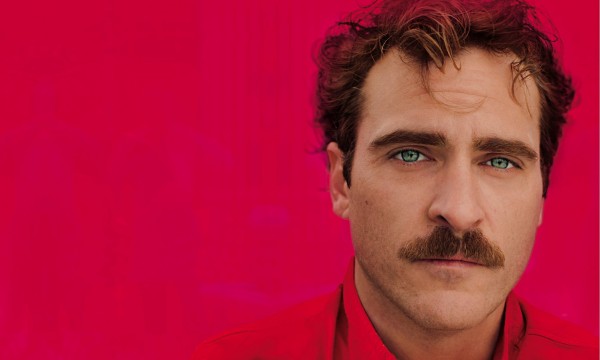
1. Joaquin Phoenix’s mustache first attracted me to this film.
2. The year 2025 seems like a very lonely, interestingly fashionable time.
3. People are so lazy in 2025 that they hire writers to compose love letters for them.
4. Joaquin Phoenix has a picture of a naked, pregnant woman on his phone.
5. Who gets off by being strangled with a dead cat?
6. Joaquin Phoenix needs to stop going after terrible women.
7. Life lesson from this movie: don’t fall in love. Ever.
8. This film reminded me how lonely I am.
9. Realized that Spike Jonze and I have a similar vision of a day where it becomes fashionable to sport a mustache once more.
10. Samantha and all the other Operating Systems reminded me of a friendly version of Skynet.
August 12th, 2014 / 3:15 pm
Affix Your Tinfoil Headware and Dive into The Exegesis of Philip K. Dick
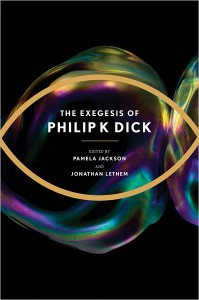 The Exegesis of Philip K. Dick
The Exegesis of Philip K. Dick
by Philip K. Dick
Edited by Pamela Jackson & Jonathan Lethem
Houghton Mifflin Harcourt, 2011
976 pages / Buy from Amazon
Some authors’ lives are more interesting than their literary output. I’d rather read Ted Morgan’s excellent William S. Burroughs biography Literary Outlaw than any Burroughs’ book other than Junkie. Philip K. Dick led such a grandiose life that he’d belong in this category if he hadn’t written A) so many interesting novels and short stories and B) at least three major novels in Ubik, The Three Stigmata of Palmer Eldritch and The Man in the High Castle. He also left behind an unwieldy hunk of mystagogic scout work now known as The Exegesis of Philip K. Dick.
Let’s get some basic facts out of the way. Dick is popularly known as the author who inspired films like Blade Runner, Total Recall and Minority Report. He was mired in the pulp mills of sci-fi for most of his career (44 published novels; 121 short stories). He was prescribed (!) meth-amphetamine and gobbled whatever drugs he could pillage from his mother’s medicine chest. He enjoyed the company of five different wives. Most significantly, he experienced a series of mystical encounters:
1) A beam of pink light told him that his son had a rare, serious birth defect that needed medical attention. This couldn’t have been observed with the naked eye. At the hospital doctors confirmed Dick’s otherworldly diagnosis. His wife from that period corroborates the story.
2) When a delivery girl came to his door wearing a fish sign necklace that was worn by the early Christians, Dick came to believe in an underground network of secret Christians that he was being initiated into.
3) During a period of heavy amphetamine use, he looked into the sky and saw a menacing, metallic, malevolent god. This wasn’t a transitory hallucination. The old triple-M sky-god looked down on Dick for a number of days, serving as inspiration for his masterpiece The Three Stigmata of Palmer Eldritch.
4) Most spectacularly, Dick reached the conclusions that:
– Time was an illusion
– Reality was a hologram
– The year was actually 50 A.D.
– The Roman Empire never ended
– Without having read The Book of Acts, he independently recreated parts of it in his novel Flow My Tears, The Policeman Said.
Much of this is revealed as the tractate in his novel VALIS, whichfrequently references Dick’s exegesis, defined as a “critical explanation or interpretation of a text or portion of a text, especially the Bible.” Up until recently, only a truncated version had been published, but self-styled Dickheads were desperate for more. Jonathan Lethem, Pamela Jackson and a team of editors dug through Dick’s cartons of manic exegeting and in 2011 Houghton Mifflin Harcourt published a thousand page volume titled The Exegesis of Philip K. Dick.
August 11th, 2014 / 10:00 am
“Cunny Poem Vol. 1” by Bunny Rogers
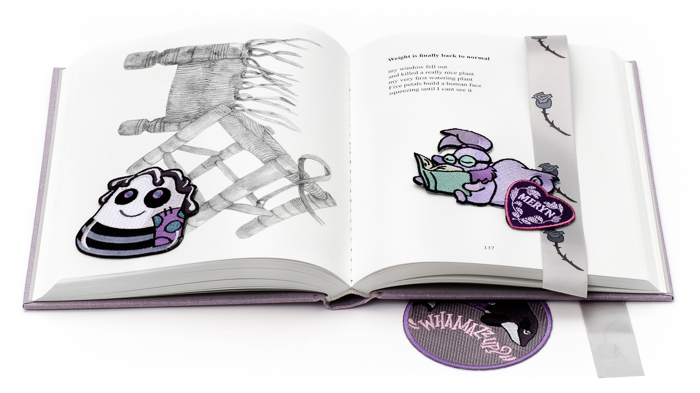
All men are cops
cuff me Im guilty
cuff me Im guilty
cuff me Im guilty
Cunny Poem Vol. 1 is an archive, a complete archive, of Bunny Rogers’ poems posted on her tumblr Cunny Poem. As an artist, Rogers’ work focuses on the multiplicity of meaning inherent in objects such as ribbon, blankets, flowers (see her interview with Harry Burke in the latest issue of Mousse Magazine). This sentiment can be felt as well in her newest project. We can look at the book as an object. It is comprehensive. The rose ribbon, speaks to the cover, speaks to the badges, speaks to the dried flowers, speaks to the words inside. Brigid Mason’s illustrations are as haunting as they are beautiful, a horse minus a hoof, a riveting world of eyes and postures. The book becomes multi-dimensional in an extraordinary way, leading us to question what the book can become.
August 7th, 2014 / 3:00 pm
25 Points: New Tab
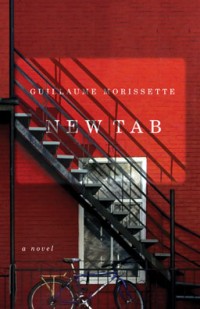 |
New Tab
by Guillaume Morissette
Véhicule Press, 2014
224 pages / $19.95 buy from Véhicule Press or Amazon
|
1. Video games don’t offer happiness—or exciting work environments.
2. This novel reminded me how bad I am at French. (My dreams of conversing with Guillaume in a foreign language are crushed.)
3. My generation is both really poor and unhappy—even with college degrees and semi-supportive parents. (On the bright side: we like to party a lot.)
4. Don’t know why Ines and company allowed Dan to live with them. Even if he did offer to pay cash up front, why would you want to live with a creepy forty-something?
5. This novel furthered the American stereotype that Canadians drink a lot of beer.
6. Brent’s an asshole—I don’t like him. (Whomever “Brent” was based off of, if you’re reading this, I hope we’re given an opportunity to meet and reconcile so my current opinion of you can change to a more positive one.)
7. When I first started this novel, the writing style kind of reminded me of Taipei by Tao Lin—but I got over that quickly because Morissette’s characters were actually interesting.
8. To reiterate: I liked this novel way more than Taipei.
9. To whomever “Cristian” is based off of: let’s build an ice rink together.
10. This novel really made me want to move to Montreal. Apparently that’s where the party’s at.
August 7th, 2014 / 12:00 pm
25 Points: Sorrowtoothpaste Mirrorcream
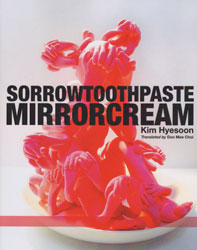 |
Sorrowtoothpaste Mirrorcream
by Kim Hyesoon, translated by Don Mee Choi
Action Books, 2014
106 pages / $12.00 buy from Action Books or Amazon
|
1. I requested a review copy of this book because I loved Don Mee Choi’s previous translation of Kim Hyesoon’s All the Garbage of the World Unite.
2. I loved it so much that I would read one of her poems at my own poetry readings (not as my own of course, but yeah I wish I’d written them).
3. Secretly, I want to brush my teeth with sorrowtoothpaste. Doesn’t seem like it’d be overly minty. And if I used mirrorcream, I’d wonder if I’d see myself as others see me.
4. The first great phrase in this book is “clammed up like a cavity-ridden piano.” We are introduced to to characters, Melan and Choly. They are my friends too.
5. I feel these poems the way I feel seaweed in my teeth: uncomfortable but familiar.
6. The poem, “Glasses Say” might be some re-imagining of Adrienne Rich’s “Diving into the wreck.” I said might:
“…A vacant place. Only fan shells, a hook, an oxygen tube, a pair of goggles.
And a lady behind the goggles.
I shave a large piece of ice to make lenses.
I put the lenses in my mouth.
It’s raining in the sea.”
7. Umbrellas, ocean, water, ice. Nipples, milk, clouds, spit.
8. As I read, I’m not sure if what I’m seeing is what I’m really seeing, or if what I’m feeling is really feeling what I’m feeling. The sadness doesn’t overwhelm me. It sits in my chest like an orb, just sort of just glowing. I remember what this feels like. I have been this sad. I don’t think my sad was this beautiful.
9. “…I’m filled with all the screams of the world / that there is nothing else but that…”
August 5th, 2014 / 12:08 pm
Juliet Escoria & Scott McClanahan’s Honeymoon Tour Diary (Part 3)
Read the entire Juliet & Scott honeymoon saga here.
FRIDAY, JULY 11 2014 (CONTINUED)
CHICAGO
JULIET: We got to Kelly & Jacob Knabb’s around 5pm. They have a really cute baby. They also have two really cute dogs but the dogs barked and the baby didn’t so I think I like the baby more. Kelly and Jacob were both reading with us that night.
We were running very late. (Kelly & Jacob live about an hour outside of Chicago and there was a lot of traffic.) It was making me nervous. I tried to not care about running super late and it was hard. I kept on telling myself that readings never start on time and no one would care if we were late. I didn’t entirely believe myself.
When we were a block away from the reading, Scott pointed out the window and said, “Is that Sam?” I looked where he was pointing. It was Sam Pink. He was walking in the opposite direction of the reading. I rolled down the window and yelled “Hello” in an unintentionally funny voice. We kept on driving.
Rachel Pattycake Bell met us outside, along with Nathan Masserang, Brooks Sterritt, Austin Islam and some other people who I am possibly friends with on Facebook. Rachel gave us Hello Kitty marshmallows and a chocolate phone as a wedding present. No one cared that we were late. We made some jokes about not being able to make phone calls because your phone had melted because it was made out of chocolate. Scott took off his shirt and changed into a new one outside the building because the one he was wearing had gotten sweaty during the drive. I tried to block him so people didn’t see his fat stomach or his weird tan. I thought it was strange that he wasn’t ashamed to change his shirt in the middle of the street in front of a bunch of people, but he’s a lot less fat now than he used to be so maybe he was excited to show off his hot bod.
August 4th, 2014 / 2:00 pm
A Lower Deep: On Snowtown
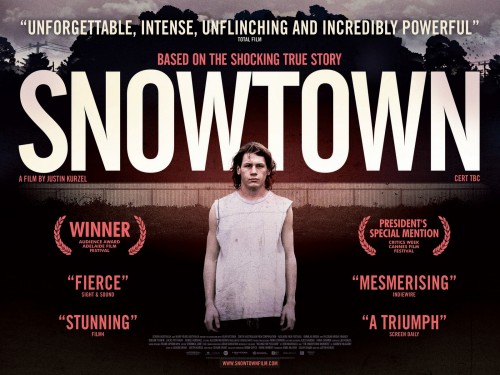
Trigger warning: this post discusses sexual violence.
The following post contains spoilers.
***
Snowtown. That is the proper title of the film. It is infinitely better than The Snowtown Murders, the title the film was given for its American release. The Snowtown Murders is obvious and boring. Snowtown is mysterious and foreboding; it implies that what happened in Snowtown is unspeakable.
It is a haunting film. It is not so much about the murders themselves, or the man who masterminded them, as it is about an innocent boy’s descent into hell.
Lucas Pittaway stars as the boy in question, the 16 year-old Jamie. An unnerving early scene makes it clear that he, along with his brothers, are being sexually abused by their mother’s boyfriend. In another (even more disturbing) scene, Jamie’s older brother Troy bullies him, wrestles him to the ground, and anally rapes him. Pittaway’s performance is striking in its understatement: he seems resigned to his miserable lot in life; drawn deep into himself, he is there, but he’s not. Observe Pittaway in the poster above: the expressionless face, the blank stare, the body language that suggests that he is trying to disappear into his surroundings. It is a chilling portrait of the nature of trauma, a surface of numbness beneath which lies an abyss of pain.
Eventually a man named John Bunting comes into his life as his mother’s new boyfriend. John seems to be the first person in Jamie’s life to stand up for him; John harasses the mother’s abusive ex-boyfriend, who happens to live across the street (a perpetual reminder of Jamie’s trauma) until the man moves. A scene in which John crushes severed kangaroo body parts (which he eventually throws at the ex-boyfriend’s house) is perhaps the first sign that something ugly lurks beneath the man’s friendly demeanor. Later on he invites Jamie over for dinner; in the middle of the meal, he turns to Jamie and says simply, “Do you like being fucked?” He then forces Jamie to shoot his (John’s) dog. This is the beginning of John’s total domination of Jamie, who he enlists as an accomplice in a series of murders. John tells Jamie that he is going to show the boy how to stick up for himself but what he actually does is destroy what remains of Jamie’s soul.
The obvious question is why Jamie goes along with John’s brutal actions. In one scene, Jamie sits silently in one room while in another John and his accomplice Robert viciously torture Jamie’s brother Troy. At this point, among others, Jamie could conceivably attempt to alert neighbors and/or notify the police and yet he does not. The abuse he has already suffered seems to have permanently broken his spirit; he is unable to act on his own accord when faced with the transgressions of his latest abuser. John thus enlists Jamie because, despite his rhetoric, on some level he sees the boy as the perfect accomplice, an individual over whom he can exert total control.
August 4th, 2014 / 10:00 am
Calabasas
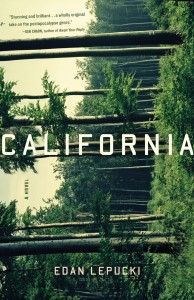 California
California
by Eden Lepucki
Little, Brown and Company, July 2014
400 pages / $26 Buy from Amazon
Even before picking up Eden Lepucki’s 2014 post-apocalyptic-near-future novel California, I’ve been enthusiastic about the city of Calabasas, or as Nick would say, “obsessed with.” Calabasas is at the edge of Los Angeles, where Mulholland Drive ends its twenty-one mile tour through Hollywood’s dark heart. Located in a southwest curve of the San Fernando Valley, it is just on the other side of the Santa Monica Mountains from Malibu, but it’s as far from a beach paradise as the moon. When I ask my mom what she knows about Calabasas she looks at me and asks, “Isn’t that where all the porn is?” Who wouldn’t be obsessed?
Nick and I relocated to Los Angeles last summer. Since then I’ve been preoccupied with William Mulholland and his vision for the city: bringing water and commerce to the desert. Putting a whole bunch of people where really, they don’t belong. Werner Herzog, Joan Didion, Mike Davis and countless others have tried to capture the sense of LA being the end: the end of the road, the end of history, the end of the world, without denying it’s also a bit of paradise: full of promise, a beginning, the future. It’s a place where millions of people go to work every day. Moby claims to have moved to LA explicitly for its “pre-apocalyptic strangeness” and because it was “always seemingly an inch away from some sort of benign collapse.” At the city’s fringes, that benign collapse is already underway.
On the face of it, Calabasas synthesizes many of the repelling and alluring adjectives attributed to LA: success, consumption, celebrity ‘culture’ (desirable, self-absorbed, etc.), wealth, exclusivity, naïveté, and so on. It similarly has aspects of the “near future,” “pre-apocalypse strangeness,” “dystopian,” “wasteland,” often ascribed to the city of angels. In the never-ending quest to articulate this captivating paradox: Calabasas represents a microcosmic example to study and to look for answers.
In California Lepucki’s anonymizes and generalizes the state’s geographical space and social concepts into pronouns like “The Land,” and communities such as “The Community,” or “Walmart.” However, she decided not to change the name of one Los Angeles community: Calabasas. The LA Times critic Karolina Waclawiak says of the novel, “In this deeply stratified ‘afterlife,’ the wealthy still hoard what little resources are left (intermittent electricity, expensive Internet, packaged food) and shelter themselves away in Communities with names like ‘Calabasas’ and the nearby ‘Pines.’” I don’t think this is a coincidence. If you’re searching for a particular brand of ill-omened California to inspire a portentous novel, Calabasas is a wise choice.
August 4th, 2014 / 10:00 am
The Part of You I Am Not: Hsia Yü’s Salsa trans. by Steve Bradbury
 Salsa
Salsa
by Hsia Yü
Translated by Steve Bradbury
Zephyr Press, 2014
248 pages / $18.00 Buy from SPD or Zephr Press
“I am that man and that man is unaware
Others are also unaware (but regarding these you’d best ask Borges)”(from “Salsa”)
Jorge Luis Borges has been reincarnated as a radical poet from Taipei, and Salsa invites you to her personal hell. In Hsia Yü’s most recently translated book of poems, we come face-to-face with an inferno of identity crises.
Salsa was first published in 1999, but this new bilingual edition, put out last month by Zephyr Press, features the original Chinese text and Steve Bradbury’s revised English translation. Bradbury admits his rendition may leave “many readers befuddled” due to his unwillingness to “narrow the semantic space or resolve syntactical ambiguities.” But Bradbury’s translation often opens up the poems, providing them room to grow in a manner reminiscent of Stephen Mitchell’s renditions of Rilke. Chinese poetry translated into English often reads as spare, solid kernels of thought, most likely due to the Imagist influence of Ezra Pound’s translations in Cathay. Pound’s relationship to Chinese poetry in English has been firmly established; Bradbury, however, following Hsia Yü’s lead, is more interested in breaking new linguistic ground. [1] Bradbury’s English no doubt embellishes on Hsia Yü’s Chinese, as it allows for more vernacular wandering than Karen An-hwei Lee’s atmospheric and sparse treatment of Hsia Yü, as specifically seen in Lee’s version of “To Be Elsewhere.” [2] Bradbury’s style loosens up Hsia Yü’s work, and her poems exhibit a conversational playfulness even when dealing with individuality, revolution, and death.
These poems, in Bradbury’s rich versions, take rigid philosophical language and cast it in the mold of interpersonal relationships. They read as if someone wrote a break-up letter to being itself:
“The part of you I am in love with includes the part of you I am not
And strangely enough this only seems to have
‘Returned me to myself’ so much so
I’ve even come to understand the you which has yet to understand
The part of me that understands you”(from “In the Beginning Was the Written Word”) [3]
The translation isn’t so befuddling as Bradbury bashfully claims, though Hsia Yü’s language constantly folds into a nest of meta-emotions, acting as a multi-limbed chimera or an ouroboros eating its own tail. What draws the speaker to her lover is a fragment of the lover she isn’t, which allows her “self” to return to her, so that she begins to realize that a fragment of her lover doesn’t understand the fragment of the speaker that does understand the lover. I found the experience of reading many of these verses like a lyric ping-pong match.
August 1st, 2014 / 10:00 am
